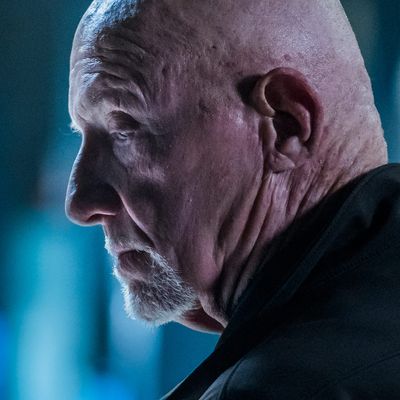
Becoming Saul Goodman isn’t like stepping into a phone booth and emerging in uniform as Superman. Jimmy McGill is never really inseparable from his eventual (though not forever) alter ego or, as we gathered in his sendoff to Francesca, vice versa. He hasn’t yet settled on “Saul Goodman” — once an in-joke for his amusement while masquerading as the Spielberg of local commercials — as his permanent, professional nom de plume, but mistake ye not: The man who slings burner phones to bikers, lies to Kim about his bruises, and rips up the number of a shrink she recommends in a manner that foreshadows Francesca shredding incriminating documents is the same as Saul in mind, body, spirit.
If there were a precise, consciousness-switching moment, that toilet forestalling might have been it, though who could blame Jimmy for failing to see the value of therapy given Howard’s current state? Whatever went down between the two of them, or between he and Chuck, or he and Kim (not that Jimmy knows about that last bit), a combination of considerable wealth and twice-a-week psychologist visits ought to have been enough to stave off insomnia. Yet, here he is. What Jimmy’s really swearing off when he flushes that doctor’s digits is the onus of guilt and, to a considerable degree, goodness, that slips into sleeplessness.
Maybe Jimmy’s better off owning his bad, broken state. Howard’s the kind of guy who, despite teetering on the brink of madness, still shows up to court in his suit and tie and does what’s expected of him. Jimmy’s more likely to splinter off as his alter ego and stumble into late-night trouble selling the aforementioned, CC Mobile prepaid clamshells out the back of his Esteem (shameless plug for my deep dive into that Suzuki charmer). Except it’s no longer Cicero or Chicago circa the 1980s, a fact Jimmy later laments out loud as Kim nurses his wounds. Saul’s future life of underworld chicanery may end up with him requesting a ride to his new, droll existence as Omaha Gene, but at least up until getting his face reorganized by Jesse Pinkman as a parting gift, he’d kept his nose mostly clean in the literal sense. Time, in other words, to ditch the Dog House tracksuits and dust off those colorful Davis & Main two-pieces in earnest.
Saul didn’t necessarily head north to the Cornhusker State with the utmost of creature comforts (shoutout to Robert Forster’s relocation expert, Ed), but it had to have been better than how Gus shuttled candidates for meth-lab engineers to Albuquerque. The irony is, carsick German master blaster Werner Ziegler had a much better handle on what Mr. Fring was looking for than the prior interviewee, a too-suave Frenchman who got sent back on the first transatlantic flight. (Though, much to Ziegler’s dismay, there would be no actual blasting or other attention-getting technique permitted.) Either that or Gus has an ultimately lethal fetish for hiring bookish eccentrics for whom navigating conundrums is their sole raison d’être. (Probably the latter.) Werner never says outright how long it will take him to transform the laundry facility’s exposed basement into a fortress of crystal-synthesizing solitude, but Gus is a fairly methodical fellow, and there’s reason to think the project stretches out over years. By the same logic, it could be completed in six months and sit waiting for half a decade until its ideal occupant — Walter White — makes Gus’s acquaintance.
Mike is about as enthused with all this as he was to open up at Stacey’s grief-venting group, but he’s no less compelled to partake. For much of season four, he and Jimmy have been on mutually exclusive journeys, but the truth is they’ve been paralleling each other’s free fall into some fairly dark, self-hating places. And their paths will intersect again soon in ways that might have them both nostalgic for the days of debating whether to snag a Bavarian Boy from some schmuck couch-surfing in his own printer-sales office. (Mike’s half-sincere “Are you okay?” to a hyperventilating Werner was, like many a Hummel, virtually priceless.)
All of Saul’s key characters (including those off-screen in “Quite a Ride,” like Nacho) are slipping into circumstances that threaten their independence, and not necessarily in terms of staying out of jail. Kim continues pushing back against Paige (enjoying Cara Pifko’s committed turn to corporate hard-ass) and Mesa Verde, this time blowing them off to amend her and paralegal Viola’s oversight with some paperwork so she can help flailing addict Denise avoid the severest consequences for her actions. This has become Kim’s crusade now — practically forcing on-the-margins young people like Denise and teen vandal David to show up for court so she can help argue their way to a second chance. All as (or because) her own closest companion, Jimmy, continues making choices she can’t control, with repercussions she’d rather not face.
Kim will turn out okay. She may wind up unable to save Jimmy from himself, and possibly will ditch Mesa Verde and the law altogether for some other purpose. (You can almost hear cold-open Francesca pining, “Why didn’t you take me with you?”) But ever since her car accident, Kim has been driven to dictate her story, while Jimmy — always tragically close to being that good, self-realized man — has all but ceded the wheel to Saul.
Apart From All That
• Love seeing Marlon Young (as Jimmy’s probation officer), most recently a Survivor’s Remorse standout, in anything.
• Of course Bill “invented chicken.”
• Can’t escape those Isotopes.
• Given his reaction to some peroxide, Jimmy would not have dealt well with what Nacho endured.
• Street view of 8351 Louisiana Boulevard circa 2017.
• Will be interesting to see where Jimmy will be in nine months and 24 days.

